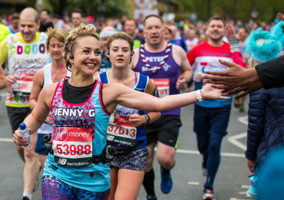Virtual fundraising events organised by the company behind the London Marathon enabled charities to raise over £50m in 2020, although this is less than would have been expected from in-person events.
Today London Marathon Events (LME) revealed its fundraising figures for last year, with the majority of the £50m raised for charity down to the virtual interpretation of the Virgin Money London Marathon,
In 2020 LME was only able to host one in-person event – the Vitality Big Half – before lockdown forced events to be postponed and cancelled. Where comparable figures are available they suggest that virtual raised much less than in-person events.
LME events is one of largest sports fundraising organisers in the UK. Alongside the London Marathon, its portfolio includes Prudential RideLondon and Children With Cancer’s Swim Serpentine.
Virtual fundraising was less lucrative than in-person
Although £50m is a significant sum of money, it is lower than the sum raised through the company’s event fundraising in previous years.
For instance, in 2019 the company’s flagship event, the Virgin Money London Marathon, raised over £60m by itself. Whereas last year’s virtual version London Marathon raised £36.3m, according to today’s figures.
Similarly PrudentialRide London events raised £11.5m in 2019, but when reimagined as a virtual event in 2020 it raised £3m.
LME said that the Vitality Big Half raised £1.2m through a combination its live event on 1 March and a virtual event in October.
Elsewhere, a new virtual event, the 2.6 Challenge, which took place when the London Marathon would have happened, raised over £11.6m.
Virtual fundraising ‘played a vital role’
Charities said that during a challenging year, when the sector faced an estimated shortfall of £10bn, the sums raised through virtual events were vital.
Claire Rowney, executive director of fundraising, marketing and innovation at Macmillan Cancer Support, said: “These activities have provided a crucial lifeline to many charities, like Macmillan, which have been so acutely impacted by Covid-19.
“Right now, we are facing a devastating loss of income due to the pandemic, and the vital funds raised by participants and supporters of these events will help us continue to do whatever it takes to be there for everyone from day one of their cancer diagnosis and provide the vital support so many rely on.”
Fiona Chilton, head of mass participation Fundraising at Marie Curie, which raised £200,000 via the The 2.6 Challenge in April, added: “While we missed the Virgin Money London Marathon and Prudential RideLondon, the virtual alternatives provided the opportunity for supporters to challenge themselves and raise funds. The money raised by these challenges allowed Marie Curie to support more people in their own home and protect the NHS. It funded our frontline hospice care and helped us expand our free support line at a time when the country needed us more than ever.”
Others highlighted the additional benefits of virtual events for people who previously could not be involved in big sporting fundraisers.
Poppy Bostock, events fundraising manager at Mind, said: “[Virtual events] also allowed us to reach a wider audience of supporters with people who may not have got a place in the physical London Marathon able to take part virtually. The events felt very inclusive and we look forward to being involved in them in the future.”
Meanwhile, Julia Sobik, head of sporting Events at Alzheimer's Research UK, said: “We were able to give our supporters an event day experience (albeit a bit differently) worthy of their amazing fundraising and training, and at the same time recruit new supporters into the charity who would have otherwise never taken part in the marathon, a hybrid model which moving forward provides great opportunities for charities and we are excited about.”
The London Marathon is planning a hybrid event for this autumn. On Sunday 3 October 50,000 people will take part in the mass event in London and 50,000 people will run 26.2 miles on the course of their choice anywhere in the world in the virtual event.
Hugh Brasher, event director at London Marathon Events, said: “We all hope that we will see the return of the events we love later this year. We are working hard with our colleagues in the mass participation sports industry to bring back events and parkrun safely and we believe that the recent Reunion 5K at Kempton Park, which was part of the government’s Events Research Programme, was a major step towards that.
“Exercise and mass participation events across the UK are so important for the mental and physical health of the nation in addition to the millions raised for charities.”
Related articles












